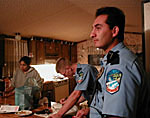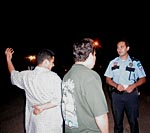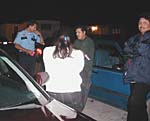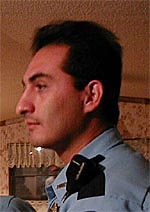By Jeff Horwich
Minnesota Public Radio
November 26, 2001
|
| RealAudio |
Minnesota's Hispanic population has grown dramatically in the last decade. So has the demand for Spanish language skills in the workplace. Clients who can't speak English are also becoming common for hospitals, courts, police departments and social service agencies. In the small central Minnesota town of Melrose, one rural police officer is helping his department relate to the town's changing population.
| |
|
|
|
||
On a typical Saturday night in Melrose, Officer Pedro Ortega cruises from the cemetary deep in the woods, past the Jennie-O turkey plant, across the bridge to the darkened soccer fields. But often he ends up in one particular part of town.
"It's a trailer park, called Rose Park. And this is where most of the Hispanics live," Ortega said, as he drove his cruiser toward a call there. "They live around the city too, but this is mainly where they're all living now."
On this night, the St. Cloud Police Department caught a couple of juveniles shoplifing at one of the area stores who weren't carrying any identification. They told the St. Cloud officers they lived in Rose Park. Ortega needs to find out where.
It's not a dramatic assignment, but it means doing what Ortega does better than anyone else: Chatting up the locals, making connections, bringing the Melrose police into the Hispanic community.
| |
|
|
|
||
The new census says this Stearns County town of 3,000 has a Hispanic population over 12 percent. But Hispanics here, as in similar Minnesota towns, may be significantly undercounted. Ortega was born in Plainview, Texas, and came to Minnesota as a teenager when his parents moved to Willmar. After law enforcement training, he was hired here.
Ortega says he knew as a teenager he wanted to get into police work. It didn't have anything to do with his language abilities, but his skills have turned out to be valuable. He estimates about half of his calls are now in Spanish.
"Especially with a language barrier, they couldn't speak English, so a lot of times that's the reason that they wouldn't speak with other officers anyway, because they wouldn't understand them," Ortega said. "So they'd deal with things in their own way."
"Their own way" often meant fights. People thought the police were useless, so they wouldn't even bother to call. Ortega says when they did arrive, officers would have trouble sorting the situation out.
| |
|
|
|
||
Craig Maus is the other officer on duty this night. It's usually quiet enough that he and Ortega can team up for calls in Rose Park or elsewhere. He was on the force for a few months before Ortega joined.
"We tried to get across what we could we with our little bit of Spanish skills, and a lot of things were misunderstood, between what we were trying to tell the Spanish speaking people ans what we were actually telling them," Maus said. "So with Officer Ortega here we've bridged the gap . . . and communications are 20 or 30 times better than they ever could have been without him being here."
Calls about trouble in Rose Park have dropped off significantly. Ortega says many Hispanic residents are still ignorant or contemptuous of some rules that don't exist in Mexico, such as vehicle open container alcohol laws. But just by speaking their language, he's helped the police become a presence in their community.
| |
|
|
|
||
"They respect me because they know I'm doing my job," he said. "They all respect me for it, and they know that I'm out there to help them out. I'm out there to help them, and uphold the law too. They understand that."
After knocking on doors and chatting with groups of young people hanging out in the dark, Ortega eventually finds the homes of the young shoplifters being held 40 miles away in St. Cloud. One man needs to arrange to pick up his brother. Ortega helps make the arrangements, since the man doesn't speak any English.
Ortega says he didn't start out wanting to be a Spanish cop. He started out just wanting to be a cop. But in two years on the job, he's realized speaking Spanish gives him a role to play. And in Minnesota, he'll only become more important. In fact, he says he heard the state patrol is looking for a few good Spanish speakers. He might be just what they need.
More from MPR



